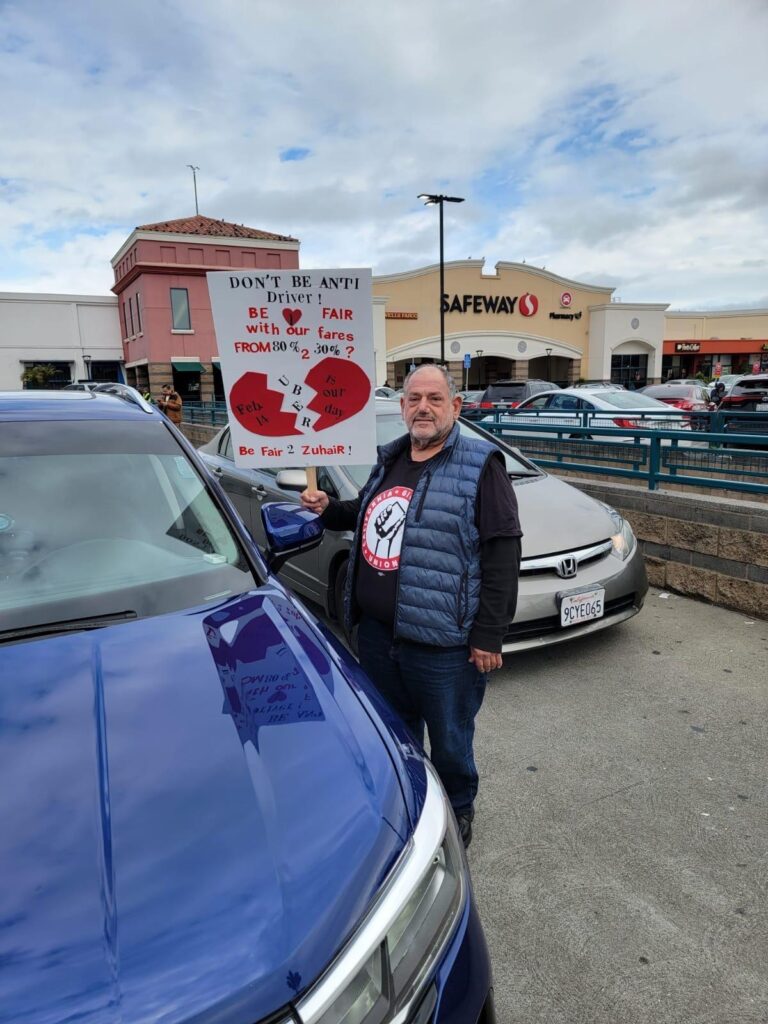Valentine’s Day is a time to reflect on relationships, good or bad. Sadly, I was recently ghosted by my partner of eight years. Since then, I’ve spoken with dozens of my partners’ other exes who had almost identical experiences. Things started out great, gradually got worse and then—nothing. Poof!
So this Valentine’s Day, we’re organizing to say enough is enough.

We are drivers for Uber, Lyft, Doordash, and other companies that use the word “partner” to describe our relationship because they refuse to call us employees. Because of this distinction, we can’t access benefits like paid sick leave, unemployment, or a guaranteed minimum wage. And we can’t be fired. Instead, we are “deactivated”—locked out of our accounts without explanation, without a human being we can contact, with no sense of when or how or even if we can get back to work.
I was deactivated from Lyft almost a year ago. A rider had asked me to make an illegal turn to pick them up and had cursed at me through my window when I said no. They refused to cross the street to get into my car, so I drove away. Moments later, I turned off the app to go into a store. When I came back out, the Lyft phone app informed me that I was deactivated and that the company would contact me.
I’d been driving for Lyft for eight years and had never received anything less than a five-star rating. I hadn’t had any previous issues with or complaints from passengers. The Lyft representative who called me three days after this incident acknowledged that and listened to my side of the story before telling me that I was being permanently removed from the platform.
In the year since my deactivation from Lyft, I’ve been driving exclusively for Uber. This year I will mark ten years of driving for them. I’m what they call a “diamond driver,” which is Uber’s highest tier based on customer ratings, cancellations, and acceptance rate. I’m on my sixth car driving for them.
I do this work because knee and shoulder surgeries have limited my mobility, and because it used to give me the flexibility to take time off to be with my family in Palestine. But I know that I’m just one arbitrary decision away from losing this job too.
That’s why, in the past year, I’ve done something more. I joined Gig Workers Rising, a community of rideshare and delivery drivers who are organizing to win better wages and working conditions from the “gig economy” corporations.
For the first time, I get to meet with other drivers, share our stories and experiences, and develop strategies for how we can make our voices heard. I was born and raised in the US, but many of my driver colleagues were not, and I’ve been supporting them to bridge the language barrier as we navigate together through a wave of deactivations.
In the past week, both Lyft and Uber have released their annual financial reports. Uber turned a profit for the first time in its history. Lyft beat its revenue projections, and both companies’ stocks spiked with the news.
But it’s a hard time to be a driver. Not only have the arbitrary deactivations picked up, but the companies are taking an ever-bigger share of our earnings. Because of our organizing and information sharing, we know that the exact percentage differs from driver to driver, the algorithm deciding just how much it can extract from us before we quit and work elsewhere. Because we are “partners” and not employees, we don’t have any say over or even any visibility into how much we are paid.
These are the reasons why drivers across the US and Europe are turning off their apps and demonstrating this Valentine’s Day. I was in the front car Wednesday as we drove in caravan to Uber’s global headquarters.
We are asking for a fair share of the profits we make for these corporations, who couldn’t make a dollar without us. We are asking for transparency and due process to protect our livelihoods from being taken away without explanation.
It would be illegal for a company to treat its employees this way. It’s no way to treat a “partner” either.
Z.P. Moganum is a gig worker, born and raised in San Francisco, and a member of Gig Workers Rising, a California-based organization who advocate for gig workers.







